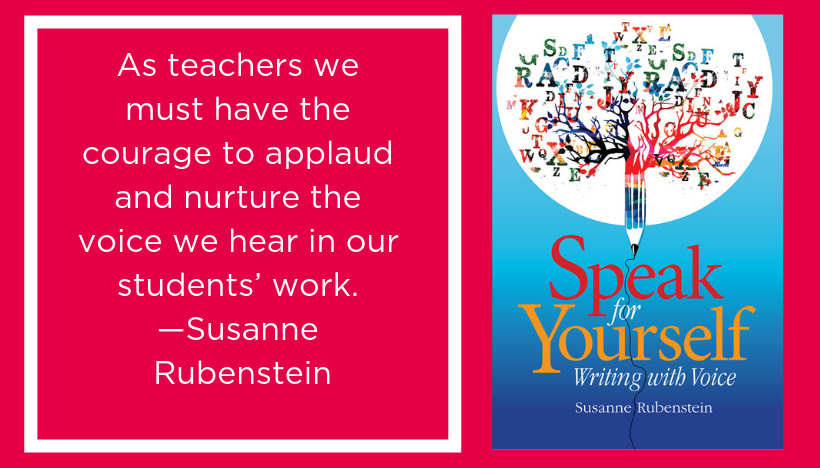This post was written by Susanne Rubenstein, author of Speak for Yourself: Writing with Voice (NCTE, 2018).
I started writing Speak for Yourself: Writing with Voice because it seemed to me that my students had grown quiet. Their participation in discussion faltered and their words on the page were flat and formulaic.
But the more I wrote about the disappearance of voice in my students, the more I realized that one reason their voices were becoming harder to hear was because mine was, too. In this age of standardized writing instruction and this time of regulated evaluations and assessments, teachers have lost power and agency.
As a profession, we have grown quiet, silenced by the voices of bureaucrats and businesspeople, politicians and pundits, all those who stand outside the classroom but profess to know what should be done within.
One unfortunate outcome of this is that we have given in to the kind of writing instruction that produces bland and boring writing, one that values correctness over creativity and structure over style, and as a result, we have stopped appreciating writing for the art that it is. It’s time we all—students and teachers alike—start to speak for ourselves in voices that are loud and clear and, most of all, authentic.
I believe in the power of I. I believe, I think, I know.
Template writing, prescribed writing, and writing only by the rules rob students of the opportunity to discover exactly what it is they do believe, think, and know. Though the pronoun I is often banished from student papers, particularly on a secondary school level, I believe it’s time to encourage students to write from this first person point of view.
Chapter 2 of Speak for Yourself, titled “I Openers,” offers teachers a variety of writing assignments that open with the pronoun I. “The Things I’ve Lost” focuses on a wonderful essay of the same name by Brian Arundel. “The Things I Carry” is inspired by Tim O’Brien’s Vietnam novel The Things They Carried. “I Prefer . . . ” models Wislawa Szymborska’s poem “Possibilities” as a way to express individual identity. All of the many activities in this chapter engage students and encourage a sense of ownership in the writing they do, and as students tackle these assignments, they are reminded that each one of them possesses a distinct voice that deserves to be heard.
As teachers we must have the courage to applaud and nurture the voice we hear in our students’ work.
Whether it be through creative pieces like those described in the chapter “The Magic of Memoir” or through analytical work, as discussed in “Making a Case for It,” students need to be given the freedom to develop a unique voice.
Though it’s easier to determine a student’s grade based on such things as spelling errors, grammar mistakes, or issues with organization, English teachers need to trust in their professional expertise as they assess student voice and guide students to strengthen their voice. Chapter 7, “But What‘s It Worth?,” offers teachers a variety of ways to consider voice in order to make it an integral part of the evaluation of student work.
Over the past few years I’ve asked my students to write about learning to write. In a freewrite (never graded and with the option of anonymity), students reflect on the years they have been in school as writers. I’d strongly encourage every teacher to try this because I’m certain you’ll be surprised and moved by what your students have to say.
I read lines like “. . . teachers have created a bunch of writing robots who spit out essays in the exact same format and style,” or “Most of the time we are forced to follow guidelines that take us farther and farther from our own voice,“ or most poignantly, “As a kid I enjoyed writing. Now when I write I get unhappy,” and I know that something is wrong with writing instruction today.
And I know that we as classroom teachers have the power to change what is wrong. We simply have to speak up and inspire our students to do the same.

Susanne Rubenstein, an English teacher at Wachusett Regional High School in Holden, Massachusetts, is the author of three books published by NCTE: Speak for Yourself: Writing with Voice; Raymond Carver in the Classroom: “A Small, Good Thing”; and Go Public! Encouraging Student Writers to Publish.

